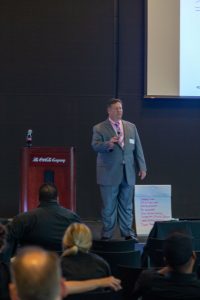 Not long ago I was on stage for a keynote presentation for Subway Development. We reached a point in the presentation where I asked,
Not long ago I was on stage for a keynote presentation for Subway Development. We reached a point in the presentation where I asked,
“What do you do?”
From the very back of the room a lonely voice I could barely hear said,
“I manage a Subway.”
I said, “What does that mean?”
She said, “Well what do you think it means?”
To which I said, “Ah, yes, you’re right! If you let me decide what it means it could mean anything! Let me rephrase the question.”
“What should I think it means?”
And she said, “Well, I’ve never thought about that before.”
Have you considered what it means to do what you do? It is a question that deserves some careful consideration. And how we answer this key question will determine not only what others think of what we do, but what we think of what we do as well.
Our work reflects who we are. It is the essence of what we think of ourselves. Adults in their 40’s and 50’s working entry level positions have a different opinion of themselves than do those of the same age in corporate positions who leave to start a business.
This is an area that deserves deep thought and contemplation. And just like my friend in the back of the room at the Subway meeting, very few people give it any thought at all.
That’s why I was there, to help them understand they must determine what they do, what their employees do, and why they do it. After working with them for over four years I helped them come up with this statement:
“I manage a unit for an international company that is the worlds largest franchise.”
Is it true? You bet. Does it sound like more than I manage a Subway. Darn straight.
And it means more to the person saying it than the person hearing it. Every time she says this, she’s reminded she’s a part of something much bigger than the task at hand.
That realization changes the way she serves the client, represents the company, and ultimately, thinks of herself.
She has an obligation to the whole. Her little part of the world just became a whole lot bigger, more important, essential.
She’s a part of something far more important than she thought. An international company is depending on her.
Perhaps you don’t work for a large organization. Maybe you’re a solopreneur. Still, have you considered,
“What do you do?”
Spend time considering the impact you have. There are clients and their families, vendors, the greater community, and of course your friends and family that are depending on you.
You are far more vital to the whole than you’ve considered. Give yourself the credit you deserve when answering, “What do you do?”
